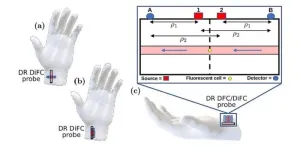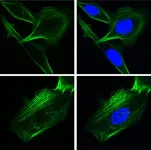(Press-News.org) Key takeaways
A new study finds that consumers often misremember if a product is labeled “scientifically studied” or “scientifically proven” — despite the significant difference in meaning between the two phrases.
UCLA psychologists conducted an experiment with one group of college students and another group of older adults to determine whether they would accurately recall which claim was made in an advertisement for a dietary supplement.
Only 26% of subjects correctly remembered which phrase was used, and the percentage who recalled the information accurately was roughly the same among both groups.
Being scientifically studied and being scientifically proven are two completely different things.
But a study led by UCLA psychologists has found that consumers often incorrectly remember marketing claims about just how lab-tested — or -proven — products actually are. The research discovered that even when products are labeled “clinically studied,” people frequently recall them as being “clinically proven.”
“‘Clinically studied’ can mean lots of things,” said Alan Castel, the paper’s senior author and a UCLA psychology professor. “Maybe the product was studied only in animals, or in people but found to be ineffective or not effective enough. ‘Clinically studied’ only shows that someone was interested enough in the product to study it, not that the study was well designed or showed conclusively that the supplement works.”
The findings, published in Applied Cognitive Psychology, suggest that the popularity of products like dietary supplements — a $21 billion industry in the U.S. alone — is due in part to consumers’ unwarranted confidence in product claims. And the study highlights anew the importance of carefully reading product labels or consulting medical professionals.
Castel studies aging, memory and brain health, and he often reads about “science-backed” brain-training products or Alzheimer’s drugs. The new study was spurred when he came across a magazine ad for a cognitive enhancement supplement with a “clinically studied” claim; Castel wondered how consumers would interpret that phrase.
With his colleagues, Castel recruited two groups of subjects to find out: one cohort of 150 college students, a demographic in which people tend to have stronger memories, and another of 166 adults at least 65 years old, representing the typical target consumer for memory supplements.
Participants were shown three versions of the ad: The original, with the “clinically studied” phrasing, one in which the scientific claim was replaced with “clinically proven,” and another that omitted the reference altogether. After being given an unrelated task meant to distract them temporarily, the subjects were asked whether they believed the claim in the ad was “scientifically studied,” “scientifically proven,” “clinically studied,” “clinically proven” or none of these.
Remarkably, only 26% of the subjects in the overall study correctly remembered which phrase was used — even though subjects were generally able to accurately remember other aspects of the advertisement, including the layout and a photo of a doctor. No matter which ad they viewed, participants tended to recall the word “proven” being present much more often than “studied.”
The younger participants remembered a few more details about the ads than the older adults, but both groups misremembered the crucial phrase about equally.
“The findings fit models of memory suggesting that we remember the gist of things better than details,” Castel said. “When people see or hear scientific claims made in vague terms, they later misremember them in more definitive terms.”
The problem, Castel said, is that even if marketers are truthful in their claims that a product has been scientifically studied, they may be taking advantage of the fact that human memory is malleable, which can easily lead consumers to trust the product without solid reasons. In particular, he said, older adults who are worried about memory loss could be susceptible to wasting money on supplements that ultimately are useless.
“How do you evaluate these claims if your memory is already slipping, or you are distracted?” Castel said.
His advice? “Don’t rely on memory before spending money or choosing a course of action. Consult others and look into it before you buy. Take time, pay attention and don’t make decisions too quickly.”
Other researchers who contributed to the study are current and former UCLA graduate students Dillon Murphy, Shawn Schwartz, Kylie Alberts and Alexander Siegel; UCLA undergraduate student Brandon Carone; and Aimee Drolet, a professor at the UCLA Anderson School of Management.
END
Often, consumers inadvertently give too much credit to products’ ‘scientifically studied’ claims
UCLA psychologists find people tend to remember vague assertions in more definitive terms
2023-07-24
ELSE PRESS RELEASES FROM THIS DATE:
ACP says the US needs immediate action to prepare for future pandemics
2023-07-24
Embargoed for release until 5:00 p.m. ET on Monday 24 July 2023
Annals of Internal Medicine Tip Sheet
@Annalsofim
Below please find summaries of new articles that will be published in the next issue of Annals of Internal Medicine. The summaries are not intended to substitute for the full articles as a source of information. This information is under strict embargo and by taking it into possession, media representatives are committing to the terms of the embargo not only on their own behalf, but also on behalf of the organization they represent.
----------------------------
1. ...
Community health workers improved homebound care during pandemic
2023-07-24
SAN ANTONIO (July 24, 2023) — Staying healthy and connected was difficult for everyone during the COVID-19 pandemic, but especially so for homebound older patients and their caregivers. Fortunately, a program developed by the geriatrics and supportive care team of The University of Texas Health Science Center at San Antonio effectively integrated community health workers (promotores de salud in Spanish) into patient outreach to improve health. Thanks to the program, annual visits to older adults with type 2 diabetes, dementia and other health issues in underserved ...
Stretchy integrated electronics may be possible with sandwiched semiconductor
2023-07-24
UNIVERSITY PARK, Pa. — There’s a barrier preventing the advent of truly elastic electronic systems, the kind needed for advanced human-machine interfaces, artificial skins, smart health care and more, but a Penn State-led research team may have found a way to stretch around it.
According to principal investigator Cunjiang Yu, who holds is the Dorothy Quiggle Career Development Associate Professor of Engineering Science and Mechanics and of Biomedical Engineering at Penn State, fully elastic electronic systems require flexibility and stretchability in every ...
Water-scarce cultures value long-term thinking more than their water-rich neighbors do
2023-07-24
Water is the world’s most valuable natural resource. Although a human can survive weeks or even months without food, going as little as three days without water could spell the end. The effects of water scarcity aren’t limited to immediate survival situations, however. Recently published research in Psychological Science suggests that cultures from water-scarce environments tend to be more likely than cultures from water-rich areas to value long-term thinking and to scorn short-term indulgence.
“Individuals from historically water-scarce climates tend to be ...
New method for noninvasive detection of circulating tumor cells in blood
2023-07-24
Metastasis occurs when cancer cells acquire the ability to spread and form new tumors in different places in the body, usually by traveling within blood or lymph vessels. Since metastasis is a hallmark of advanced cancer and severely complicates treatment, its early diagnosis is essential. One way to do this is by looking for circulating tumor cells (CTCs) in blood samples.
However, CTCs can be very rare, and they might be completely absent in small blood samples despite being present in a patient’s bloodstream. To address this problem, researchers have developed a technique called diffuse in-vivo flow cytometry (DiFC). It involves labeling CTCs with ...
Colorado River Basin has lost water equal to Lake Mead due to climate change
2023-07-24
American Geophysical Union
Release No. 23-28
24 July 2023
For Immediate Release
This press release and accompanying multimedia are available online at: https://news.agu.org/press-release/colorado-river-basin-has-lost-water-equal-to-lake-mead-due-to-climate-change/
Colorado River Basin has lost water equal to Lake Mead due to climate change
A rapid rate of reductions in runoff associated with the Colorado Basin’s snowpack region, quantified here for the first time, is largely responsible for the water loss.
AGU press contact:
Rebecca Dzombak, news@agu.org +1 (202) 777-7492 (UTC-4 hours)
Contact ...
Beyond protected areas: Novel method shows promise for monitoring biodiversity on working lands
2023-07-24
New research led by Adam Dixon, a conservation scientist with the World Wildlife Fund, describes the successful pilot of a novel method to study how well grassland birds are faring on croplands. The study, published in Ecological Applications, looked at 44 pockets of non-crop vegetation in the gaps between crop rows and at the edges of fields on lands under intensive agricultural cultivation in Iowa. The study may serve as a model for monitoring wildlife on working lands more generally, which can include crop fields, cattle ranches, and logged forests.
The researchers analyzed satellite imagery data to determine each pocket's area and “texture,” ...
Is snacking bad for your health? It depends on what and when you eat
2023-07-24
Snacking is becoming increasingly popular, with more than 70% of people reporting they snack at least twice a day. In a new study involving more than 1,000 people, researchers examined whether snacking affects health and if the quality of snack foods matters.
“Our study showed that the quality of snacking is more important than the quantity or frequency of snacking, thus choosing high quality snacks over highly processed snacks is likely beneficial,” said Kate Bermingham, PhD, a postdoctoral fellow at King's College London. “Timing is also important, with late night snacking being unfavorable for health.”
Bermingham ...
One way to reduce medical errors? Connect doctors with other doctors
2023-07-24
We trust our doctors with our lives, but the sad and scary fact is that doctors can get things wrong. Approximately 100,000 Americans die each year due to medical errors and recent studies have found that 10 to 15% of all clinical decisions regarding patient diagnosis and treatment are wrong.
A team of researchers led by Damon Centola, Professor and Director of the Network Dynamics Group at the Annenberg School for Communication at the University of Pennsylvania, has found a simple, effective way to reduce errors in patient diagnosis and treatment — use structured networks to connect clinicians with other clinicians.
In a study published today in the journal ...
Study finds new, unexpected mechanism of cancer cell spread
2023-07-24
A surprising finding from USC reveals key details about how cancer cells metastasize and suggests new therapeutic approaches for halting their spread.
The research, supported by the National Institutes of Health, centers on a cellular chaperone protein known as GRP78, which helps regulate the folding of other proteins inside cells. Previous studies from the same team, led by Amy S. Lee, PhD, professor of biochemistry and molecular medicine at the Keck School of Medicine of USC, have shown that when cells are under stress (due to COVID-19 or cancer), GRP78 gets hijacked, allowing viral invaders to replicate, ...
LAST 30 PRESS RELEASES:
The Lancet: First-ever in-utero stem cell therapy for fetal spina bifida repair is safe, study finds
Nanoplastics can interact with Salmonella to affect food safety, study shows
Eric Moore, M.D., elected to Mayo Clinic Board of Trustees
NYU named “research powerhouse” in new analysis
New polymer materials may offer breakthrough solution for hard-to-remove PFAS in water
Biochar can either curb or boost greenhouse gas emissions depending on soil conditions, new study finds
Nanobiochar emerges as a next generation solution for cleaner water, healthier soils, and resilient ecosystems
Study finds more parents saying ‘No’ to vitamin K, putting babies’ brains at risk
Scientists develop new gut health measure that tracks disease
Rice gene discovery could cut fertiliser use while protecting yields
Jumping ‘DNA parasites’ linked to early stages of tumour formation
Ultra-sensitive CAR T cells provide potential strategy to treat solid tumors
Early Neanderthal-Human interbreeding was strongly sex biased
North American bird declines are widespread and accelerating in agricultural hotspots
Researchers recommend strategies for improved genetic privacy legislation
How birds achieve sweet success
More sensitive cell therapy may be a HIT against solid cancers
Scientists map how aging reshapes cells across the entire mammalian body
Hotspots of accelerated bird decline linked to agricultural activity
How ancient attraction shaped the human genome
NJIT faculty named Senior Members of the National Academy of Inventors
App aids substance use recovery in vulnerable populations
College students nationwide received lifesaving education on sudden cardiac death
Oak Ridge National Laboratory launches the Next-Generation Data Centers Institute
Improved short-term sea level change predictions with better AI training
UAlbany researchers develop new laser technique to test mRNA-based therapeutics
New water-treatment system removes nitrogen, phosphorus from farm tile drainage
Major Canadian study finds strong link between cannabis, anxiety and depression
New discovery of younger Ediacaran biota
Lymphovenous bypass: Potential surgical treatment for Alzheimer's disease?
[Press-News.org] Often, consumers inadvertently give too much credit to products’ ‘scientifically studied’ claimsUCLA psychologists find people tend to remember vague assertions in more definitive terms





